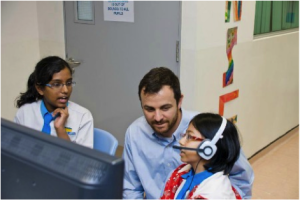Facing History and Ourselves is an international educational and professional development organization whose mission is to engage students of diverse backgrounds in an examination of racism, prejudice and anti-Semitism in order to promote the development of a more humane and informed citizenry. In the article below, Facing History’s Director of Online Community, Practice, and Research Justin Reich reflects on the role that online tools play in preparing students to become active, responsible decision-makers.
 |
|
Facing History’s Justin Reich believes online tools help students become active citizens. |
There is much debate about whether online tools can help students prepare for career and college. While career and college preparation are important goals, they aren’t the sum of the purposes of schools: Our educational institutions also have an obligation to prepare students for citizenship and for a reflective, ethical, and well-examined life.
In recent months, I’ve been thinking quite a bit about the importance of online learning in preparing students for their roles in a democracy. Democracies require people to carry on discourse with those who hold different beliefs from their own. One of the best ways to prepare for life in a democracy is to live and learn among people with a variety of ideas, values, opinions, and backgrounds.
Unfortunately, for the last two decades, school re-segregation by race and class has been surging. These issues have roots in residential settlement patterns. In urban centers, decades of integration work have been rolled backwards, and in suburban and rural areas, students increasingly find themselves living in homogenous neighborhoods. Education scholar Gary Orfield has long documented how these patterns lead to the re-segregation of American schools. His most recent report, E Pluribus…Separation, shows that racial segregation continues to grow in the United States, and so-called “double segregation” – segregation by both minority status and poverty level – is also expanding.
One of the great risks to our democracy right now is that our students increasingly go to school only with peers of similar backgrounds.
Online communities provide educators with the opportunity to push back against these trends, and to create learning spaces where students can encounter peers across differences. With this in mind, Facing History and Ourselves launched its Digital Media Innovation Network (DMIN) in 2010. The first DMIN project involved 14 schools from across the country and around the world, from Boston and Oakland to Cape Town and Shanghai. Educators and students engaged in an investigation of Reporter, a documentary about New York Times reporter Nicholas Kristof’s journalism work in central Africa, and they created media projects showcasing lives and issues in their own neighborhoods. Students from suburban Colorado talked online with students from the urban core of Oakland; teenagers from South Africa chatted with their peers in China.
Through sharing conversations and media, students had the chance to be in dialogue across difference. In these experiences, students and their teachers recognize how our lives and beliefs are shaped by the particulars of our circumstances. They also recognize our shared humanity, which is the foundation of tolerance, respect, and civil discourse. As one student wrote in her reflection, “The most surprising thing that I learned with this project is that there are also other students and teachers that are just like we are. They might not be in the same place as we are in and they might have totally different lives that we do but we are all making a difference in our classes that can hopefully move the world.”
I hope that educators will consider not only how emerging technologies prepare students for work and study, but how they prepare young people for life in civil society. As our classrooms become ever more homogenous, online tools provide a vehicle for supporting students in encountering and engaging with a diversity of ideas and perspectives.
“This content originally appeared on the homepage of Facing History and Ourselveshttp://www.facinghistory.org/
***************************************
About Facing History and Ourselves
Facing History and Ourselves is an international educational and professional development organization whose mission is to engage students of diverse backgrounds in an examination of racism, prejudice and anti-Semitism in order to promote the development of a more humane and informed citizenry. By studying the historical development of the Holocaust and other examples of genocide and mass violence, students make the essential connection between history and the moral choices they confront in their own lives. Facing History has provided in-depth seminars for more than 29,000 educators, and its active teacher network reaches nearly two million students annually. For more information, visit facinghistory.org and watch a video at facinghistory.org/video/face-it.





